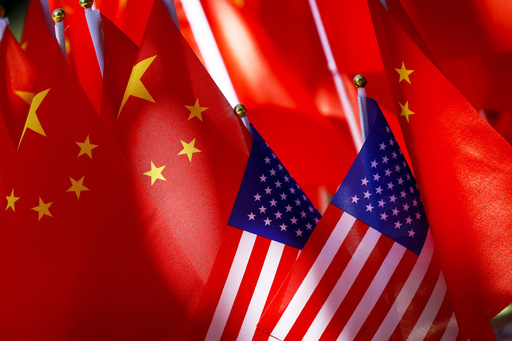
BANGKOK — The U.S. Commerce Department has added numerous Chinese technology firms to its export control list, particularly targeting those involved in the production of computer chips, associated equipment, and software.
The latest update includes around 140 companies, most of which operate in China; however, a few are Chinese-owned businesses located in Japan, South Korea, and Singapore.
The newly revised regulations were made available on the U.S. Federal Register on Monday and are expected to be officially published later this week. In addition, these rules place restrictions on the exportation of high-bandwidth memory chips to China, which are essential for handling significant data volumes in advanced technologies like artificial intelligence.
In response, China’s Commerce Ministry expressed its discontent and indicated it would safeguard its “rights and interests,” without providing explicit details on how it would respond.
The ministry characterized the move as a “typical act of economic coercion and non-market practice.”
Commerce Secretary Gina Raimondo explained that the objective behind these actions is to hinder China’s ability to exploit advanced technologies that could potentially threaten U.S. national security.
Being added to the so-called “entity list” implies that U.S. companies are likely to have their export licenses denied for transactions with these Chinese firms.
The Biden administration has progressively broadened the scope of affected companies under these export restrictions while promoting growth in semiconductor manufacturing and investments within the United States.
Matthew S. Axelrod, the assistant secretary for export enforcement, commented on the U.S. strategy, stating, “The purpose of these Entity List actions is to stop PRC (Chinese) companies from leveraging U.S. technology to indigenously produce advanced semiconductors.” He further noted that including critical semiconductor fabrication facilities, equipment producers, and investment firms on the list serves to directly undermine China’s military modernization efforts, weapons of mass destruction programs, and human rights abuses.
Accusations from China claim that the U.S. is focused on achieving “technology hegemony,” especially given the increasing scrutiny on Chinese tech firm Huawei and other advanced technology manufacturers who are being restricted from accessing American suppliers.
China has raised concerns over what it terms “long-arm jurisdiction,” particularly regarding the U.S. decision to extend export controls to companies involved in the production of chip-making equipment in countries such as South Korea, Taiwan, and Singapore, provided they utilize any U.S. technology that could be sold to China.
The pressure from the U.S. has catalyzed China to enhance its endeavors in developing advanced computer chips and related technologies, pouring billions into subsidies and investments aimed at this sector. Despite being several years behind in numerous areas, Chinese manufacturers have made significant strides recently.
Stock prices of Japanese chip manufacturers and related equipment producers saw a notable increase on Tuesday, with Advantest and Tokyo Electron both rising by 4.6%, and Applied Materials climbing 4.9%. Disco Corp., another contributor to the chip industry, registered a remarkable 6.9% increase, while the Tokyo Nikkei 225 stock index recorded a 2.3% gain.
In contrast, shares of China’s Naura Technology Group, which is included on the new list, dropped by 3%, and fellow chipmaker Piotech Inc. experienced a 5.3% decline.
